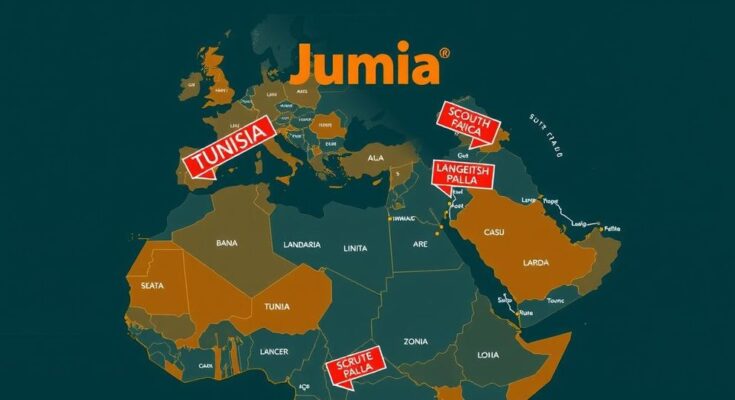Jumia is discontinuing its operations in Tunisia and closing its South African clothing platform, Zando, by the end of the year as part of a cost-reduction strategy. This move follows the closure of Jumia Food in seven African countries amid challenges in achieving profitability in these markets. The company aims to focus on regions with stronger growth potential, despite experiencing a 17% revenue decline in early 2024. Jumia continues to operate in several African countries while expanding its warehouse infrastructure.
Jumia has announced significant operational changes, including the cessation of its services in Tunisia and the closure of its South African clothing platform, Zando, by year-end. These actions are part of a broader strategy aimed at cost reduction and consolidating its market presence. According to a company spokesperson, “Money isn’t limitless, and we prefer to focus on other markets where growth prospects are strong.” Previously, just under a year ago, Jumia had discontinued its home meal delivery service, Jumia Food, in seven countries including Tunisia and South Africa, as part of its continued effort to cut costs. Jumia had also exited from Cameroon and Tanzania as a part of similar restructuring efforts made in 2019. From its headquarters in Abidjan, the company asserts that Zando and its operations in Tunisia represented a mere 4.5% and 3% of its gross merchandise value, respectively, during the first half of 2024, suggesting limited impact from the closures. The primary challenge cited by Jumia in South Africa centers on the misalignment of Zando’s services with the current strategic focus under CEO Francis Dufay, who is pivoting the company towards cosmetics and electronics. Furthermore, the market dynamics shifted after Amazon’s entry into the South African market last spring, leading to a strategic reevaluation. In Tunisia, macroeconomic difficulties and the small market size have rendered profitability unattainable for the company. CEO Francis Dufay expressed optimism regarding Jumia’s ability to recuperate lost volumes from these markets by redirecting resources to more successful areas. The company is preparing to expand its warehouses in key urban centers such as Cairo, Lagos, Abidjan, and Casablanca, while also targeting secondary cities and rural demographics. Jumia’s operations continue across Algeria, Uganda, Senegal, Ghana, and Kenya. Notably, Jumia has already reduced its workforce by 40% since Dufay’s tenure commenced in November 2022. In the first half of 2024, the platform experienced a 17% decline in revenue, amounting to $36.5 million. Additionally, in August, Jumia successfully secured nearly $100 million through a public share offering on Wall Street. As of October 16, Jumia’s stock was priced at approximately $5.06.
Jumia is an e-commerce platform operating throughout several African countries, aiming to enhance online commerce in a region that often faces various economic and logistical challenges. The company has acknowledged difficulties in maintaining profitability within certain markets and has made the strategic decision to curtail operations in areas where growth is not meeting expectations. This ongoing restructuring reflects the company’s broader focus on consolidating resources and directing efforts toward more lucrative markets, a move that has included significant layoffs and the cessation of underperforming services, such as Jumia Food and Zando. The competitive landscape has also evolved, such as the entrance of major players like Amazon, prompting Jumia to adjust its operational strategies to stay relevant. Jumia’s commitment to Africa’s diverse markets involves a strategy that includes targeting urban and rural areas alike, fostering growth where conditions are more favorable, and continuing to expand their workforce and infrastructure in thriving regions.
In summary, Jumia’s recent announcements regarding the cessation of operations in Tunisia and South Africa reflect a strategic shift aimed at enhancing profitability and concentrating efforts in markets with more promising growth potential. The company’s proactive approach to curtailing services in underperforming markets, while simultaneously expanding in others, underscores its commitment to adapt to the competitive landscape and achieve sustainable growth. Despite facing operational challenges and a decline in revenue, Jumia remains optimistic about future recovery and the reaffirmation of its strategic focus.
Original Source: www.theafricareport.com




